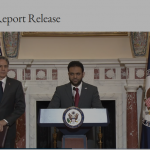By Coptic Solidarity –
Egypt currently has some 135 ambassadors on-post abroad, and about 20 consul-generals (with an administrative rank of ambassador).
Over the past few weeks, we at Coptic Solidarity were able to survey the names of 128 of these ambassadors and 16 consul-generals. The conclusions are consistent with previous surveys we’ve done over the past twenty years and kept in a database of Egyptian ambassadors and consul-generals created by Coptic Solidarity. Although Copts, the indigenous Christian inhabitants of Egypt, account for, at the very least, 10 percent of Egypt’s population—and should, therefore, account for, at the very least, 10 percent of Egypt’s diplomatic corps:
- No Copts are appointed to any major Western capital (Washington, London, Paris, Bonn, Rome, Ottawa, etc.).
- No Copts are appointed to any major non-Western capitals (Tokyo, Beijing, Moscow, Delhi, etc.)
- No Copts are appointed to any international organization.
- No Copts are appointed to any Arab or Muslim country.
- No Copts are appointed as consul-general—anywhere.
- Copts appointed as ambassadors (to smaller countries) cannot exceed three at any time. This is in line with the permanent policy of the Egyptian state to keep Copts in public posts below a ceiling of two percent. Currently they are posted in nations that one might argue are of little significance to Egypt: Congo, Cameroon and Peru. (A recent presidential decree, published on May 17 on the new appointments which are to take effect during this coming summer, includes a female Copt appointed as ambassador to Slovakia. However, and based on unswerving precedent, we expect that one of the three other Coptic ambassadors will end their mission in the coming months.)
- To be clear, the number of Coptic ambassadors is limited, because the number of Copts accepted to the diplomatic corps in general is capped to 2 percent.
We challenge the Egyptian government to deny the veracity of the above facts.
More importantly, we challenge anyone who denies that discrimination against Coptic Christians in their own homeland is an institutionalized and systemic policy.

Nor is such discrimination limited to diplomatic corps; it permeates every state institution. As one recent example, on March 3, 98 female judges took the legal oath in preparation for assuming judicial roles in Egypt’s State Council. This was considered a major and unprecedented development; since its inception 75 years earlier, not a single woman had sat on the podium of the State Council court—and now 98 will. And yet, not one of them is a Christian—again, despite the fact that the Copts account for at least 10 percent of the nation’s population, suggesting that at least 10 of the 98 should have, for proper representation, been Copts.
If not admit to these shameful policies, Egypt’s rulers should at the very least take concrete steps to rectify them—for they are more obvious than they think.






[…] A June 19 report argues that “institutionalized discrimination against Copts in Egypt” is even […]
… [Trackback]
[…] Informations on that Topic: copticsolidarity.org/2022/06/19/institutionalized-discrimination-against-copts-in-egypt-the-case-of-diplomatic-corps/ […]